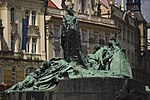European Association of Archaeologists
The European Association of Archaeologists (EAA) is a membership-based, not-for-profit association, open to archaeologists and other related or interested individuals or bodies in Europe and beyond. It was founded in 1994 at an inaugural meeting in Ljubljana, Slovenia, where its Statutes were formally approved, and recognized by the Council of Europe in 1999. EAA has had over 15,000 members on its database from 75 countries. EAA holds an annual conference (Annual Meetings) and publishes the flagship journal, the European Journal of Archaeology. The EAA also publishes an in-house newsletter, The European Archaeologist (TEA), and two monograph series (Themes in Contemporary Archaeology and Elements: The Archaeology of Europe). The registered office of the association is in Prague, Czech Republic.
Excerpt from the Wikipedia article European Association of Archaeologists (License: CC BY-SA 3.0, Authors).European Association of Archaeologists
Jesuitenstraße, Ingolstadt Altstadt Nordwest (Mitte)
Geographical coordinates (GPS) Address Website Nearby Places Show on map
Geographical coordinates (GPS)
| Latitude | Longitude |
|---|---|
| N 50.0875 ° | E 14.421388888889 ° |
Address
Katharinen-Gymnasium
Jesuitenstraße 10
85049 Ingolstadt, Altstadt Nordwest (Mitte)
Bayern, Deutschland
Open on Google Maps









